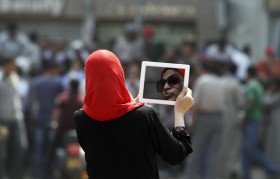 The back seat of Joanna Joseph’s Hyundai is still stained with the young woman’s blood.
The back seat of Joanna Joseph’s Hyundai is still stained with the young woman’s blood.
Joseph, a volunteer with Operation Anti-Sexual Harassment, helped rescue the 19-year-old from Cairo’s Tahrir Square on Jan. 25 as Egyptians marked the second anniversary of the uprising that toppled Hosni Mubarak. Walking through the square on her way home from work, the victim was accosted by a gang that raped her with a knife, according to the doctor who operated on her and witnesses of the attack. It was one of 29 assaults documented that day in Tahrir, which has been plagued by sexual violence since it became the center of political protests.
The wounds weren’t only physical. “She kept saying, ‘It would have been better that I’d died than live with such a shameful memory,’” Joseph, 46, said, recalling the drive to the hospital. The woman’s aunt said she tells neighbors her niece broke her leg to explain why she doesn’t leave the house. They both declined to be named, fearing dishonor to their family.
The case has helped galvanize human rights campaigners as Egypt’s Islamist-led government rewrites the penal code and definitions of gender-based violence. It has also underscored the uphill fight against society’s tendency to blame the victim and absolve men, and the state, of responsibility, said Mozn Hassan, head of Nazra for Feminist Studies, a Cairo-based nonprofit organization.
The Tahrir Square attacks constitute “a major crime against women,” said Nehad Abo Komsan, head of the Egyptian Center for Women’s Rights. “It can’t be brushed off.”
Female ‘Devils’
Some political and religious leaders have tried to do just that, she said. The anti-harassment group documented 19 assaults — women being groped, violated, their clothes ripped off — on Jan. 25 in the square. Tahrir Bodyguards, another volunteer organization, chronicled 10. There have been no arrests.
While the state-run National Council for Women condemned the violence and opened a probe, council members declined to be interviewed about it, nor would they talk about the measure they’re writing to criminalize sexual harassment and assault. Mohamed Abdel-Salam, a spokesman for the 30-member council, 20 of whom are women, said he didn’t have copies of drafts of the bill. It’s supposed to be sent to the new parliament that will be seated after general elections are held.
Some male members of the Shura Council, Egypt’s temporary legislative authority, said in a public session that what happened Jan. 25 should teach women to avoid dangerous places, and suggested segregation during political gatherings.
Their remarks came after a popular preacher known as Abu Islam said in an online video that female protesters want to be raped. “Those women have no shame, no fear and not even femininity,” he said. “They are devils.”
‘Societal Roots’
That mindset is common, said Hassan of Nazra for Feminist Studies. “Sexual harassment has tormented the country for decades, and its significance has been downplayed,” she said. “The state has ignored a problem with deep societal roots.”
Hundreds of women were back in Tahrir after the Shura Council members’ comments, brandishing kitchen knives to protest gender-based violence and political and religious leaders’ endorsement of the widely held belief that women invite attacks. A 2008 study by the Center for Women’s Rights said 62 percent of men admitted to sexually harassing women, and 53 percent said women who are harassed “bring it on.”
The proposed law the women’s council is writing may replace those against “hitk ird,” Arabic for assault against morality, which covers a range of crimes from touching a woman’s breast to cutting her genitalia with a knife.
Death Penalty
Rape in Egypt is punishable by death or life imprisonment, according to a law instituted by the military council that replaced Mubarak and ruled until the election of President Mohamed Mursi. It’s unclear whether anyone has been tried or sentenced under this law because the Interior Ministry doesn’t make the information public, according to Dalia Abdel Hameed, a gender rights officer at the Egyptian Initiative for Personal Rights, a nonprofit in Cairo.
In Egypt — which has a population of 83 million — reports of “hitk ird” rose to 349 in 2012 from 330 in 2011, and reported rapes went to 129 from 119, Abdel Fattah Othman, an assistant to the Interior Minister, told the state-run Al-Ahram newspaper.
Most women are too ashamed to go to the police or even tell their relatives, said Joseph, the volunteer who drove the 19- year-old to the hospital.
“The victim makes up stories for her parents, because she’s scared they might blame her or lock her up inside the house,” she said. “If the attack leaves bruises, she’d just cover up her body, and avoid contact with her parents till they’re healed. That’s a real load on the victim.”
